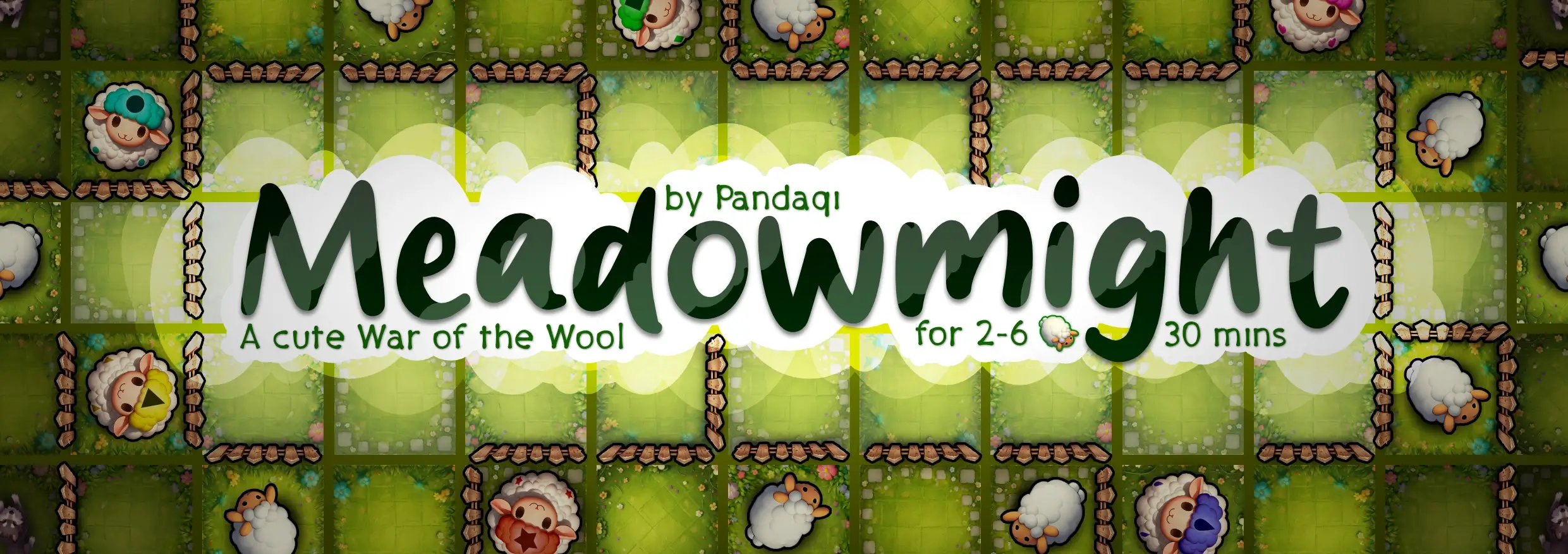Each player picks one color and gets all 5 tiles showing that sheep: their Sheeple. Take all unused Sheeple out of the deck.
Shuffle the deck and deal each player 3 tiles. (Each player should hold 8 tiles in total.)
Finally, place a random tile (faceup) on the table.
The game ends when all players are out of tiles. Highest score wins!
Take clockwise turns. On your turn, either PLAY or CHANGE, then draw 1 tile from the deck.
Play a tile from your hand, faceup to the table.
- It must be next to an existing tile or on top of a facedown tile.
- You can’t play a Sheeple into a meadow that already has another player’s Sheeple.
- The maximum board size is 8x8.
If your tile connects multiple meadows (owned by different players), a conflict happens.

Discard 2 tiles from your hand to rotate an existing tile.
- You may orient the tile however you like.
- You can’t rotate a tile that has a double fence on any side.
- You can’t take the change action anymore once any player has run out of tiles.
If this change connects multiple meadows (owned by different players), a conflict happens.

Count the size of each meadow on different sides of the tile. Exclude the tile that caused the conflict itself.
The biggest meadow wins. All Sheeple inside the losing meadow(s) are turned facedown.
- If tied, count the number of Sheeple: highest wins.
- If still tied, you cannot take this action.
There can never be a single meadow claimed by multiple players. If the tile that caused the conflict contains a Sheeple of the wrong color, it’s also turned facedown.

You score for each enclosed meadow ( = fences on all sides) that contains a Sheeple of yours. Facedown tiles should be considered as “closed on all sides”.
- Each tile inside the meadow is +1 point.
- Each neutral sheep inside the meadow is also +1 point.
So yes, you score each meadow only once, regardless of the number of Sheeple you have.

Once you’ve played the base game a few times, maybe you’re ready for some expansions or variants!
In these rules, the term “adjacent” always means horizontal or vertical, never diagonal.
This is a variant you can play with the same material. It’s much friendlier, as it allows bigger scores and multiple people to claim meadows.
The following rules change.
SCORING: When counting your final score,
- You score every Sheeple inside an enclosed meadow. (So now you can score meadows multiple times!)
- Every Sheeple from another player (in your meadow), however, is -1 point
PLACING & CONFLICT:
- There is no maximum board size.
- You can play a Sheeple in the same meadow as another. Conflict only happens when two meadows, which were previously separate, are connected.
- If so, count diversity first. The meadow with the highest number of different Sheeple wins. (If tied, apply the usual rules: number of tiles, number of sheeple, otherwise conflict is forbidden.)
CHANGING: The change action also allows moving an existing tile (instead of rotating). Do so according to the following rules.
- You can only move tiles that contain neutral sheep.
- They move one step, to an adjacent tile. (Yes, this overlaps existing tiles.)
- They cannot move over a double fence.

This is a variant you can play with the same material.
During setup, equally distribute all tiles over facedown piles. Each player receives one such pile. They insert their own Sheeple into it and shuffle.
During gameplay, you only draw tiles from your own deck. Your hand limit is 6.
Optional: for a game with less conflict (but more tension and luck), include fewer Sheeple per player.
This expansion adds four special tiles with their own rules.
Wolf: When placed, you may move all adjacent tiles that have a sheep. Move them one step, to a tile that’s adjacent to them. (Yes, this may overlap existing tiles, even faceup ones.) Tiles that didn’t move are turned facedown.
Tree: When placed, you have a choice. Either rotate 2 tiles for free, or draw a tile (permanently increasing your hand size by 1).
Pond: All adjacent tiles with a sheep score +2 points. If there are no adjacent tiles with sheep, when placed, you may take one Sheeple of yours back into your hand.
House: This tile and all adjacent tiles cannot be rotated.
Due to the extra tiles, the maximum board size is raised to 10x10.
